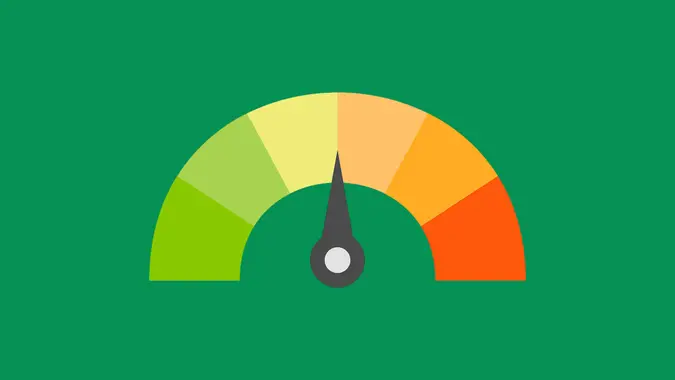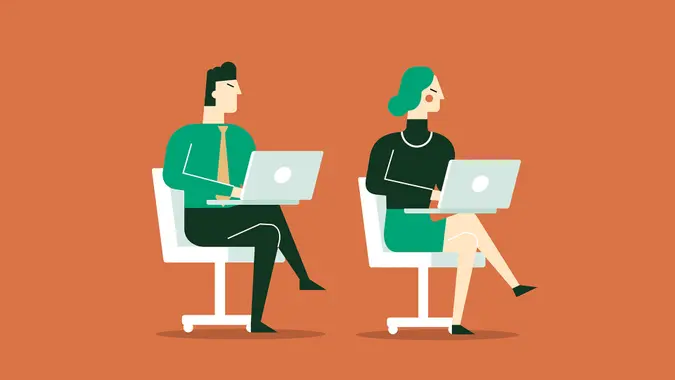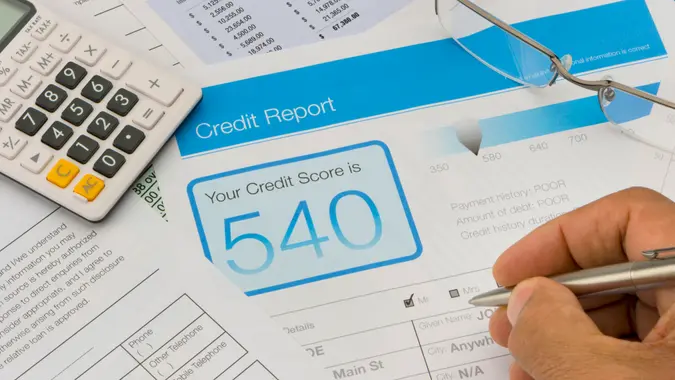Does Breaking a Lease Hurt Your Credit? Here’s What You Should Know

Commitment to Our Readers
GOBankingRates' editorial team is committed to bringing you unbiased reviews and information. We use data-driven methodologies to evaluate financial products and services - our reviews and ratings are not influenced by advertisers. You can read more about our editorial guidelines and our products and services review methodology.

20 Years
Helping You Live Richer

Reviewed
by Experts

Trusted by
Millions of Readers
Most landlords don’t report monthly payments to credit bureaus unless you’ve signed up for a rent-reporting service like RentReporters or Experian’s RentBureau.
That means paying your rent on time won’t boost your credit score. Missing payments or breaking a lease won’t immediately hurt your credit, but it can lead to some serious consequences.
How Breaking Your Lease Can Affect Your Credit Score
On its own, breaking a lease doesn’t automatically ding your credit. But if you’re breaking a lease, make sure you leave nothing unpaid — or you could feel the financial effects for years.
Let’s say you leave the apartment early and owe a few months of rent, cleaning fees or other charges. If those go unpaid and your landlord sends them to a debt collector, that’s when your credit can take a hit.
Debt Collections and Broken Lease
If your unpaid rent is sent to collections, that’s where trouble starts. Debt collectors can report those unpaid balances to the credit bureaus — and that’s when a broken lease shows up as a negative mark on your credit report.
A collection account can drop your credit score by 50-100+ points and stays on your credit report for up to 7 years.
What About Evictions or Legal Action?
Getting evicted doesn’t appear directly on your credit report either, but some legal actions can.
If your landlord takes you to small claims court over unpaid rent and wins, the resulting judgment becomes a public record. These public records can also show up on some credit reports, depending on the scoring model used.
Additionally, many landlords report rental behavior to tenant screening services, which other landlords can access during future apartment applications — even if it doesn’t touch your credit report.
How Long Does a Broken Lease Affect Your Credit?
If you pay what you owe and your landlord doesn’t escalate things, your credit report might be unaffected. If collections or court rulings get involved, the timeline looks a little different:
- Collections stay on your credit report for 7 years from the date of the first missed payment.
- Paid collections carry less weight over time but are still visible unless removed.
- Judgments may remain in public record databases for years, depending on state laws and credit scoring models.
However, some newer FICO and VantageScore models ignore paid-off collections — so if you do end up with a blemish, taking care of it quickly will help limit the damage.
How To Break a Lease Without Wrecking Your Credit
Not all broken leases end in credit disaster. If you handle things thoughtfully, you can part ways with your apartment and keep your score intact. Here’s how:
1. Start With Your Lease
Before anything else, read your lease agreement carefully. It might have:
- An early termination clause, spelling out how to exit legally (often by paying one or two months’ rent)
- A notice period (like 30 or 60 days)
- Details about subletting or reassigning your lease to another renter
You’ll also want to check your state laws — some states give renters extra protections in cases of job relocation, domestic violence, unsafe living conditions or military service.
2. Have a Candid Talk With Your Landlord
Your landlord isn’t a mind reader. If you’re dealing with financial stress, a job change or something personal, open up the conversation early. Many landlords can be flexible, especially if you’ve been a good tenant.
You might be able to:
- Negotiate a lower termination fee
- Set up a short-term payment plan
- Get permission to sublet or find a replacement renter
The earlier you communicate, the better your odds of finding a fair solution.
3. Sublet or Find a New Tenant
This is one of the best ways to avoid financial penalties — and keep your credit safe.
If your lease allows it, you may be able to:
- Sublet: You stay on the lease, but someone else lives in the unit and pays you (you’re still legally responsible).
- Assign the lease: The new tenant takes over completely and signs a new agreement with the landlord.
In either case, check with your landlord and get approval in writing.
4. Put Everything In Writing
Once you and your landlord agree on an exit plan, make sure to document everything. That includes:
- Emails confirming fees, dates and next steps
- A copy of any new lease signed by a replacement tenant
- Proof of payments or deposits returned
Paper trails protect both you and your credit report.
5. Settle Any Outstanding Balances
Even if you move out, you may still owe:
- A termination fee
- Prorated rent
- Repair or cleaning charges
Make sure you pay these in full. As long as your landlord is paid and satisfied, there’s nothing to send to collections — and nothing to show up on your credit report.
The Bottom Line
Breaking a lease don’t have to affect your credit.
If you take the right steps, communicate early and cover your financial responsibilities, you can move on without leaving a dent in your credit history. But ignoring your lease — or ghosting your landlord — can come back to haunt you.
FAQ
Here are some common questions and concerns that come up while looking into if breaking a lease affects your credit:- Does breaking a lease automatically hurt my credit?
- No, but it can if you leave unpaid rent or fees that go to collections or court.
- Can landlords report lease breaks to credit bureaus?
- Not directly. But if they send the unpaid balance to collections or sue you, those actions can affect your credit.
- What if I’ve already broken a lease and it's in collections?
- You can:
- Pay it off to reduce the damage
- Try negotiating a “pay-for-delete” with the collection agency (some will remove the entry once paid)
- Dispute any incorrect info with the credit bureaus
- You can:
- Do I have any rights if I’m breaking a lease for financial or safety reasons?
- Yes. Many states have laws that protect renters under special circumstances. You can contact your local housing authority or tenant union to learn more.
- Can I break a lease and avoid penalties altogether?
- Sometimes, yes -- especially if your lease has an early termination clause or if your landlord is flexible. Finding a qualified replacement tenant can also help you dodge extra fees.
Editorial Note: This content is not provided by any entity covered in this article. Any opinions, analyses, reviews, ratings or recommendations expressed in this article are those of the author alone and have not been reviewed, approved or otherwise endorsed by any entity named in this article.
Our in-house research team and on-site financial experts work together to create content that’s accurate, impartial, and up to date. We fact-check every single statistic, quote and fact using trusted primary resources to make sure the information we provide is correct. You can learn more about GOBankingRates’ processes and standards in our editorial policy.
 Written by
Written by  Edited by
Edited by 






















